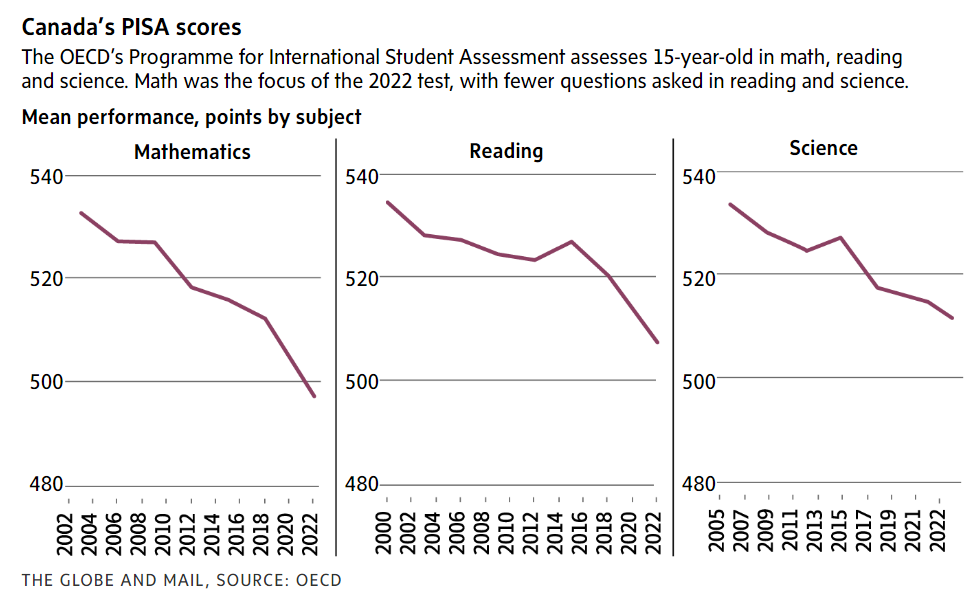Math scores of Canadian students continued their steep slide, according to a new international ranking that reinforces the continuing domestic concern about how the subject is taught in schools.
The latest results from the Organisation for Economic Co-operation’s Programme for International Student Assessment, released Tuesday, show that Canada’s overall scores declined 35 points between 2003 and 2022. Only 12 per cent of Canadian students were high math achievers, scoring at Level 5 or 6. That’s fewer than some of the top Asian countries and economies: In Singapore, 41 per cent of students performed at the top level; in Hong Kong, 27 per cent; and in Japan and Korea, 23 per cent.
The OECD test is conducted every three years and measures how 15-year-olds fare in math, science and reading. Math was the main focus of PISA in this round of assessments. Reading and science were also tested, but there were fewer questions asked.
In 2022, 81 countries participated, with 23,000 Canadian high-school students writing the test. Over the years, the test has helped drive policy decisions and curriculum changes in many jurisdictions, but has also exposed government inaction.
 In Canada, math has been a worry for politicians, educators and parents, as test scores have declined over the years. Debate has focused on how the subject has been taught in schools. Some parents and experts have advocated for a back-to-basics approach where students grasp the fundamentals rather than an inquiry-model where they learn through problem-solving, pattern discovery and open-ended exploration.
In Canada, math has been a worry for politicians, educators and parents, as test scores have declined over the years. Debate has focused on how the subject has been taught in schools. Some parents and experts have advocated for a back-to-basics approach where students grasp the fundamentals rather than an inquiry-model where they learn through problem-solving, pattern discovery and open-ended exploration.Andreas Schleicher, the OECD’s director for education and skills, said Canada’s math scores should be a cause for concern. The most recent dip cannot be blamed on pandemic-related school disruptions because scores have been declining for almost two decades.
“The world requires a lot more mathematics these days. If you do not understand an exponential function, you’re not going to follow the discussion on climate change or the evolution of a pandemic,” he said in an interview.
“We should be seeing rising outcomes, because the demands in our societies are dramatically rising, and we are seeing falling outcomes.”
The PISA math test measured mathematical reasoning as well as the ability of students to problem solve.
The latest results show that 78 per cent of Canadian students performed at or above Level 2, which the OECD considers the baseline level of math literacy to fully participate in modern society. Among OECD countries, 69 per cent of students performed at or above this level. In top-performing jurisdictions such as Singapore, Japan and Hong Kong, more than 85 per cent of students were at or above this level.
Canada has continued to perform well in a global context, with only eight other jurisdictions outperforming on the math assessment, including Singapore, Macao (China), Chinese Taipei, Hong Kong (China), Japan, Korea, Estonia and Switzerland.
However, math scores declined in all provinces since 2003, which was similar on average across the OECD. Further, one in five Canadian students scored at the lowest levels, below Level 2. Immigrant students outperformed their non-immigrant peers, and similar to PISA math tests over the years, boys outperformed girls.
At the provincial level, students in Quebec were among the top performers internationally on math, while those in Alberta, Ontario, and British Columbia performed above the OECD average. Students in Prince Edward Island, Nova Scotia, New Brunswick, Manitoba, Saskatchewan hovered around the OECD average, while those in Newfoundland and Labrador trailed behind.
Stephen Lecce, Ontario’s Minister of Education and chair of the Council of Ministers of Education, told reporters at Queen’s Park on Monday that Canada’s rank on the world stage was a “positive reflection” of how students are learning the core concepts. He said his province had made investments to strengthen the fundamentals in math and reading.
Anna Stokke, a mathematics professor at the University of Winnipeg, has advocated for schools to teach the fundamentals. She said educators continue with “ineffective philosophies based on inquiry-based learning” and that the decline in PISA math scores in Canada over the years shows that classroom practices haven’t changed.
“You can’t fix a problem by doubling down on methods that don’t work,” Prof. Stokke said. “Problem-solving skills are developed by building up foundational skills and techniques through a lot of practice. They cannot be taught in isolation.”
She worries that the country is not doing enough to build math skills among students to compete globally, and stresses the need to reverse the trend: “Math is the foundation for jobs in technology, AI, and data science.”
The PISA results also showed that, in reading, around 80 per cent of Canadian students attained Level 2 or higher in reading compared with an OECD average of 74 per cent. Further, in science, 85 per cent of students scored at Level 2 or higher, while the OECD average was 76 per cent.
CAROLINE ALPHONSO
EDUCATION REPORTER
The Globe and Mail, December 4, 2023
